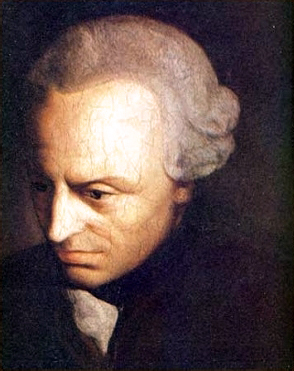April 22: Immanuel Kant
Immanuel Kant (1724)
It was on this date, April 22, 1724, that German philosopher Immanuel Kant was born in Prussia — in what is now Kaliningrad, Russia. Kant had a highly religious education, but he fell under the influence of David Hume. In 1781 he published his most famous work, Critique of Pure Reason, which proposed that all intellectual knowledge (especially Scholastic philosophy) is subjective. That thesis pretty much loosened the foundation of arguments for the existence of God. And, indeed, Kant had said in 1775, "Reason can never prove the existence of God."
Kant's unorthodox religious ideas, based in the rationalism expressed in his maxim, "Dare to know," made the government of Prussia suspicious. In 1792 King Frederick William II forbade Kant to teach or write on religious subjects. Five years later, after Frederick William had died, Kant felt he had honored the spirit of his obligation, so in 1798, he published a summary of his religious views. "Apart from moral conduct," Kant wrote, "all that man thinks himself able to do in order to become acceptable to God is mere superstition and religious folly."
Kant never exactly denies the existence of God, but admits, "The wish to talk to God is absurd. We cannot talk to one we cannot comprehend — and we cannot comprehend God; we can only believe in him. The uses of prayer are thus only subjective. ... He who has made great moral progress ceases to pray." Kant died a non-Christian theist on 12 February 1804.
Originally published April 2003 by Ronald Bruce Meyer.


